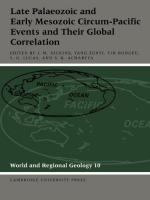|
This section contains 1,529 words (approx. 6 pages at 300 words per page) |

|
In geology, the term correlation refers to the methods by which the age relationship between various strata of Earth's crust is established. Such relationships can be established, in general, in one of two ways: by comparing the physical characteristics of strata with each other (physical correlation); and by comparing the type of fossils found in various strata (fossil correlation).
Correlation is an important geological technique because it provides information with regard to changes that have taken place at various times in Earth history. It also provides clues as to the times at which such changes have occurred. One result of correlational studies has been the development of a geologic time scale that separates Earth history into a number of discrete time blocks known as eras, periods, and epochs.
Sedimentary rocks provide information about Earth history that is generally not available from igneous or metamorphic rocks. For...
|
This section contains 1,529 words (approx. 6 pages at 300 words per page) |

|


